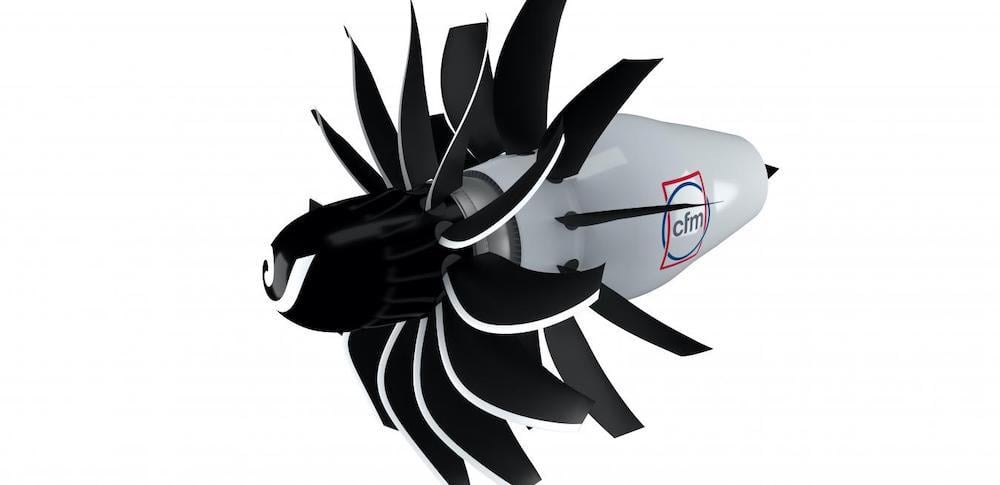
DUBAI—CFM International says the Revolutionary Innovations for Sustainable Engines (RISE) open-fan demonstrator program that is targeted at a new-generation engine for the mid-2030s will also potentially provide a pipeline of technologies to upgrade today’s LEAP-1 turbofan.
GE Aviation and Safran launched the RISE initiative earlier in 2021 and plan to do ground and flight tests on an open-fan concept architecture by the middle of the decade.
“This architecture is the most promising in helping the industry reach the net zero carbon goal set for 2050,” CFM President Gael Meheust said Nov. 16 at the Dubai Airshow.
While the most obvious focus of RISE will be on the open rotor—which incorporates a second non-rotating stage made up of variable pitch stators—the effort will also include a host of associated new technologies including a fan-drive gear system, a compact high-pressure core to boost thermodynamic efficiency, and a recuperating system to preheat combustion air with waste heat from the exhaust.
The demonstrator will also incorporate the use of advanced materials such as ceramic matrix composites in the hot section and resin transfer moulded composite fan blades, combustor designs capable of running on sustainable aviation fuel (SAF) or hydrogen, and integrated motor-generator systems adapted for more-electric engine cycle operations.
“The benefit of such an exhaustive technology-acquisition program is that it allows us to evaluate potential upgrades to our current product line with innovations that can bring performance and/or durability improvements as soon as the technologies are becoming mature, are shown to be retrofittable, and don’t adversely affect interchangeability,” Meheust said.
“If these conditions are met, we can totally envision upgrades to the LEAP engine family, much as we have done throughout the history of the CFM56 product line. There are no specific plans yet, but this is something that could happen in the future,” he added.
In the nearer term, CFM remains focused on steadily ramping up production to match rising A320neo- and 737-manufacturing rates at Airbus and Boeing respectively, and is discussing plans from the end of 2023 onwards. “Prior to the pandemic, CFM had achieved the fastest ramp up ever seen in the history of this industry,” Meheust said. “Starting from just 77 engines in 2016, we were set up to reach 2000 engines per year in 2020.”
“This was the plan. Unfortunately, we had to hit the brakes because of the COVID crisis and then slowly restart the ramp up again. This is not an easy thing to do: to stop and restart a supply chain at a time when an unprecedented sanitary crisis is disrupting the whole world,” Meheust said.
“I have to say that our teams have done an amazing job in this respect as we have been able to adapt and match the engine demand from the airframers in the short- [and] medium-term,” he added. “We have strong assets to meet our new challenge: during the first ramp-up, we have achieved [and] demonstrated a 40-engine production rate per week, while setting a strong monitoring and risk analysis of our supply chain. These settings will be key assets to ramp up again.”
As of the end of September 2021, CFM had delivered 4,830 LEAP-1 engines and has an outstanding backlog of more than 10,000 engines.
